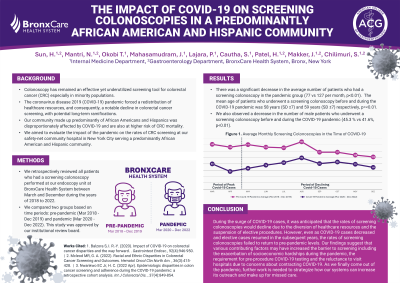Tuesday Poster Session
Category: Colorectal Cancer Prevention
P3185 - The Impact of COVID-19 on Screening Colonoscopies in a Predominantly African American and Hispanic Community
Tuesday, October 24, 2023
10:30 AM - 4:00 PM PT
Location: Exhibit Hall

Has Audio

Tobechukwu Joseph Okobi, MD, MSc
BronxCare Health System
Bronx, NY
Presenting Author(s)
Haozhe Sun, MD1, Nikhitha Mantri, MD2, Tobechukwu Joseph. Okobi, MD, MSc1, Sandhya Cautha, MBBS1, Priscilla Lajara Hallal, MD3, Jaydeep Mahasamudram, MD1, Harish Patel, FACG4, Jasbir Makker, MD, FACG1, Sridhar Chilimuri, MD1
1BronxCare Health System, Bronx, NY; 2Bronx Lebanon Hospital Center, Bronx, NY; 3BronxCare, Bronx, NY; 4BronxCare Hospital Center, Bronx, NY
Introduction: The coronavirus disease 2019 (COVID-19) pandemic has forced a redistribution of healthcare resources, and consequently, there has been a notable decline in colorectal cancer (CRC) screenings, with potential long-term ramifications. We aim to study the impact of the pandemic on the rates of CRC screening at our safety-net community hospital in New York City serving a predominantly African-American and Hispanic community.
Methods: We retrospectively reviewed all patients who had a screening colonoscopy performed at our endoscopy unit at BronxCare Health System between March and December during the years of 2018 to 2022. We compared two groups based on time periods: pre-pandemic (Mar 2018 - Dec 2019) and pandemic (Mar 2020 - Dec 2022). This study was approved by our institutional review board.
Results: There was a significant decrease in the average number of patients who had a screening colonoscopy in the pandemic group (77 vs 127 per month, p< 0.01). The mean age of patients who underwent a screening colonoscopy before and during the COVID-19 pandemic was 58 years (SD ±7) and 59 years (SD ±7) respectively, p=< 0.01. We also observed a decrease in the number of male patients who underwent a screening colonoscopy before and during the COVID-19 pandemic (45.3 % vs 41.6%, p< 0.01). Figure 1 illustrates the difference in the average number of screening colonoscopies performed monthly at our institution during the COVID-19 pandemic.
Discussion: Decline in screening rates during the surge of Covid -19 cases was not unexpected. Diversion of healthcare resources and the suspension of elective procedures played a major role. However, even as COVID-19 cases decreased and elective cases resumed, the rates of screening colonoscopies failed to return to pre-pandemic levels. We had earlier reported that pre-test screening for SARS Cov 2 was a barrier due to access to testing in our neighborhood. Moreover, patients may be reluctant to visit the hospital for elective procedures due to concerns about contracting COVID-19. Our community was disproportionately affected by COVID-19 with one of the highest mortality rates. This lead to further worsening of social economic hardships and underlying comorbid conditions. Additional focused efforts are needed to improve access and provide better coordination with primary care physicians. Elimination of pre-procedure testing may help in improving screening rates.

Disclosures:
Haozhe Sun, MD1, Nikhitha Mantri, MD2, Tobechukwu Joseph. Okobi, MD, MSc1, Sandhya Cautha, MBBS1, Priscilla Lajara Hallal, MD3, Jaydeep Mahasamudram, MD1, Harish Patel, FACG4, Jasbir Makker, MD, FACG1, Sridhar Chilimuri, MD1. P3185 - The Impact of COVID-19 on Screening Colonoscopies in a Predominantly African American and Hispanic Community, ACG 2023 Annual Scientific Meeting Abstracts. Vancouver, BC, Canada: American College of Gastroenterology.
1BronxCare Health System, Bronx, NY; 2Bronx Lebanon Hospital Center, Bronx, NY; 3BronxCare, Bronx, NY; 4BronxCare Hospital Center, Bronx, NY
Introduction: The coronavirus disease 2019 (COVID-19) pandemic has forced a redistribution of healthcare resources, and consequently, there has been a notable decline in colorectal cancer (CRC) screenings, with potential long-term ramifications. We aim to study the impact of the pandemic on the rates of CRC screening at our safety-net community hospital in New York City serving a predominantly African-American and Hispanic community.
Methods: We retrospectively reviewed all patients who had a screening colonoscopy performed at our endoscopy unit at BronxCare Health System between March and December during the years of 2018 to 2022. We compared two groups based on time periods: pre-pandemic (Mar 2018 - Dec 2019) and pandemic (Mar 2020 - Dec 2022). This study was approved by our institutional review board.
Results: There was a significant decrease in the average number of patients who had a screening colonoscopy in the pandemic group (77 vs 127 per month, p< 0.01). The mean age of patients who underwent a screening colonoscopy before and during the COVID-19 pandemic was 58 years (SD ±7) and 59 years (SD ±7) respectively, p=< 0.01. We also observed a decrease in the number of male patients who underwent a screening colonoscopy before and during the COVID-19 pandemic (45.3 % vs 41.6%, p< 0.01). Figure 1 illustrates the difference in the average number of screening colonoscopies performed monthly at our institution during the COVID-19 pandemic.
Discussion: Decline in screening rates during the surge of Covid -19 cases was not unexpected. Diversion of healthcare resources and the suspension of elective procedures played a major role. However, even as COVID-19 cases decreased and elective cases resumed, the rates of screening colonoscopies failed to return to pre-pandemic levels. We had earlier reported that pre-test screening for SARS Cov 2 was a barrier due to access to testing in our neighborhood. Moreover, patients may be reluctant to visit the hospital for elective procedures due to concerns about contracting COVID-19. Our community was disproportionately affected by COVID-19 with one of the highest mortality rates. This lead to further worsening of social economic hardships and underlying comorbid conditions. Additional focused efforts are needed to improve access and provide better coordination with primary care physicians. Elimination of pre-procedure testing may help in improving screening rates.

Figure: Figure 1
Disclosures:
Haozhe Sun indicated no relevant financial relationships.
Nikhitha Mantri indicated no relevant financial relationships.
Tobechukwu Okobi indicated no relevant financial relationships.
Sandhya Cautha indicated no relevant financial relationships.
Priscilla Lajara Hallal indicated no relevant financial relationships.
Jaydeep Mahasamudram indicated no relevant financial relationships.
Harish Patel indicated no relevant financial relationships.
Jasbir Makker indicated no relevant financial relationships.
Sridhar Chilimuri indicated no relevant financial relationships.
Haozhe Sun, MD1, Nikhitha Mantri, MD2, Tobechukwu Joseph. Okobi, MD, MSc1, Sandhya Cautha, MBBS1, Priscilla Lajara Hallal, MD3, Jaydeep Mahasamudram, MD1, Harish Patel, FACG4, Jasbir Makker, MD, FACG1, Sridhar Chilimuri, MD1. P3185 - The Impact of COVID-19 on Screening Colonoscopies in a Predominantly African American and Hispanic Community, ACG 2023 Annual Scientific Meeting Abstracts. Vancouver, BC, Canada: American College of Gastroenterology.
